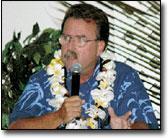“If I had to do it over again, I would have filed, even if we didn’t have the money to pay.” That’s the word from Democratic state Sen. Gary Hooser, who admitted yesterday that he made a “mistake” by not
“If I had to do it over again, I would have filed, even if we didn’t have the money to pay.”
That’s the word from Democratic state Sen. Gary Hooser, who admitted yesterday that he made a “mistake” by not filing state general excise tax returns five years in a row.
Hooser said that he and his partner in Kaua‘i-based H&S Publishing failed to file and pay because they could not afford the $89,875 in general excise taxes owed between 1985 and 1990.
“I made some mistakes 19 years ago,” Hooser said, “but I resolved those issues eight years ago. It’s old. It comes up every election. My business paid 100 percent of the taxes owed.”
Hooser, who has not owned H&S since January, 2004, said that the company paid $71,454 eight years ago — $17,421 less than the principal amount — after a deal was worked out with the state Department of Taxation to waive interest and penalties.
The Kaua‘i state senator said that he gave up ownership of H&S because he wanted to commit full-time to serving the people of Kaua‘i, and that his company simply couldn’t afford to keep him on its payroll.
Hooser’s tax admittance comes on the heels of accusations from Republican Senate Minority Leader Fred Hemmings, who accused Hooser in a report published in the Honolulu Star-Bulletin yesterday of hypocrisy for supporting an increase in the general-excise tax in the 2003 session despite owning a business that failed to pay the same excise tax.
But Hooser says that he supported the 1-percent excise tax increase because the money would go to education.
“That was the only reason I supported it, because the money was going to education,” Hooser said.
Hemmings reiterated his belief yesterday that Hooser “lied” on the Senate floor last year when he said that there were many times that he had paid his taxes before paying himself.
“He misrepresented the facts on the Senate floor a year ago,” Hemmings said. “He said that he didn’t have any problem paying more taxes, but he didn’t even pay the ones he owed.”
Hooser said that bringing the tax situation up some three weeks before the general election is a classic example of attack politics.
“Fred Hemmings is the Republican Party’s attack dog,” Hooser said.
Hooser said that the tax story has been talked about ever since he ran for office in 2000, and that Hawai‘i media had already been informed of the situation years ago and refused to follow the story.
“The Honolulu Advertiser knew all about, but decided it was a non-story,” Hooser said.
“The story is not old,” Hemmings said. “It was never published. He managed to keep it under wraps all these years.”
Two-term, former Kaua‘i Mayor Maryanne Kusaka, a Republican challenger for Hooser’s Kaua‘i-Ni‘ihau seat, distanced herself from the controversy by insisting she had nothing to do with the story’s publication, or that she had any knowledge that Hemmings was pursuing it or going to the press with the information.
“He (Hemmings) is not going to tell me what he’s going to do,” Kusaka said. “I do know that the Senate has been looking at this, and it’s been rumored around the island for several years.”
Hemmings agreed that, to his knowledge, Kusaka new nothing of the story’s publication.
But Hooser said that Kusaka is being “disingenuous” when she says she had no foreknowledge of the story, and that her campaign had long before requested his tax documents from the state, a claim Kusaka flatly denies.
“We have not requested them, not to my knowledge,” Kusaka said.
Kusaka did say, however, that Hooser’s failure to pay sets a bad example for Kaua‘i business people.
“I’ve got some business supporters that would love to be able to not pay their taxes,” she said.
“My business was managed into a successful, thriving enterprise,” Hooser said. “When we started, we struggled. I have had a lot of experience gained through my 20 years.”
Prior to 1990, failure to file for or pay general excise taxes was considered a misdemeanor, according to Stephen Hironaka, investigator with the state Department of Taxation.
“Back then, there were no criminal prosecutions per se, and violations were misdemeanors. No one did investigations,” Hironaka said. “They’d rely on the IRS. And generally they sent out a letter to non-filers,” Hironaka said.
But Hironaka warns business owners that times have changed, and that, while department officials will generally not initiate a criminal investigation when taxpayers voluntarily come forward to report their failure to file or other omissions, they are being tracked.
“Today we have a new computer system (the Integrated Tax Information Management System), and we can track things better,” he said.
Hemmings has obtained a copy of the compromise settlement Hooser and partner Robert Self reached with the state Tax Department, according to an Associated Press report.
The magazine company failed to file excise tax returns from 1985 to 1990, according to the settlement. It also says the rate used on returns for 1991 and 1992 were in dispute and the company failed to pay withholding taxes or final taxes on returns filed from 1993 to 1996.
According to the settlement, the state agreed to collect only actual taxes of $89,875, minus a credit for Hurricane ‘Iniki. The final payment of $71,454 was about half of what Hooser and Self owed in taxes and interest, according to the settlement.
The Tax Department said the alternative of seizing H&S Publishing’s assets would have netted only about $10,500 for the state.
The Associated Press contributed to this report
Phil Hayworth, business editor, may be reached at 245-3681 (ext. 251) or phayworth@pulitzer.net.


